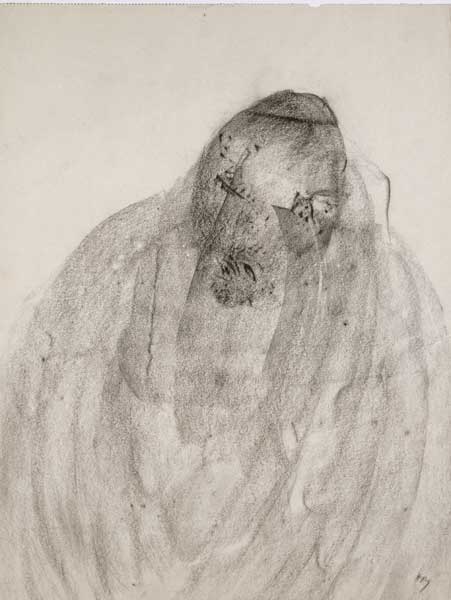Great Works: Repos dans le Malheur (1945), Henri Michaux
Pompidou Centre, Paris

Henri Michaux is known for his imaginary travelogues, his quasi-philosophical reflections, his poetry – and for his art. He began to make art in the 1930s, and the two disciplines came to be practised side by side for the rest of his life. Art seemed to offer him a purer and more perfect way of defining the nature of the self than writing because writing, he felt, was always, finally, prevented from defining reality by the troublesome presence of language. Perhaps art, like music, could be trusted to get closer to the heart of things. Surrealism proved helpful to him, though he would never call himself a Surrealist. Others chose to call him a neo-Surrealist instead. The Surrealist movement gave him "la grande permission" to be himself, to do exactly what he wanted in his art. (He also admired, and learnt from, classical Chinese painting, with its spare use of line.)
There was much that Michaux loathed about the practice of creating art: the whole "carnival" of stretched canvases; the flourish of brushes; the squeezing out of oils in their wormy, squirmy lengths; the whole, vainglorious stew of colours laid out across a palette – in fact, as he, a shy and constitutionally evasive man, saw it, all the sheer, self-important posturing and pageantry of art-making. All that was not for him.
What Michaux preferred by way of materials was something modest and more secretive – such as Indian ink, for example, with which he could make tiny, seething marks on plain paper, marks suggestive of some kind of ultimate calligraphic expression, but which might also suggest, when looked at from various angles, and with the utmost care, the frenzied movements of human beings en masse, or birds in crazed flight, or microbes doing their zizzy-zazzy manoeuvres inside the body's inner dark. He aspired, somehow, to capture the very consciousness of existence, the flow of time itself.
Repos dans le Malheur (1945) is entirely characteristic of Michaux's work. Quite secretively small in format, a mixture of Conté crayon and frottage, it is not so much a portrait of a human form as the image of an ill-defined being of quasi-human form emerging into tentative existence. It looks like a kind of ghoulish biological experiment. The being rises up ghost-like, from a thin, wispy torso, and then shoulders up to a head which is more thickly and emphatically pronounced. Mouth, eyes look like scorings, bite marks, wounds. Its translated title (Rest amidst Unhappiness) summarises its mood well: it has an air of weary, melancholy resignation, as if it is condemned to being itself in all its hulking repulsiveness – it is an elephant man for the year of its making, 1945, when Michaux would have been living in occupied Paris, a man doubly trapped by his own extreme sensitivities as an artist, and that mood, outside in the street, that the very air was tainted by suspicion, fear, danger.
This was not a moment for heroic gestures of any kind – and this work is the farthest removed that can be imagined from a work of triumphalist assertiveness. Was there relief to be found anywhere? Yes.
Michaux also experimented with mescaline, doing a series of works called "mescalinien drawings". What did the drug do for him? On one unrepeatable occasion, it gave him a vision of beatitude: "I saw thousands of gods ... Everything was perfect... I hadn't lived in vain... My futile, wandering existence was at last setting foot on the miraculous road." Beat poet Allen Ginsberg, a great admirer, loved him for this. But Michaux, unlike Ginsberg, had no talent for embracing life as if it were some ultimate lover.
ABOUT THE ARTIST
Henri Michaux was born in 1899 in Namur and died in Paris, where he lived for the greater part of his life, in 1984. His writings and his art form a single imaginative whole. His work deals in the stuff of troubling dreams: hallucinatory landscapes, feverish images of beings emerging into existence.
Subscribe to Independent Premium to bookmark this article
Want to bookmark your favourite articles and stories to read or reference later? Start your Independent Premium subscription today.

Join our commenting forum
Join thought-provoking conversations, follow other Independent readers and see their replies